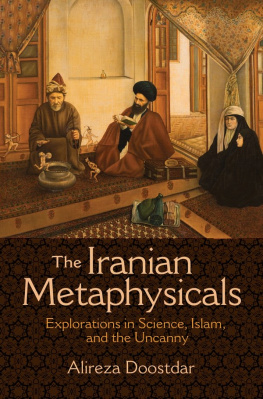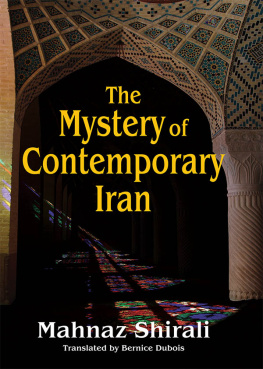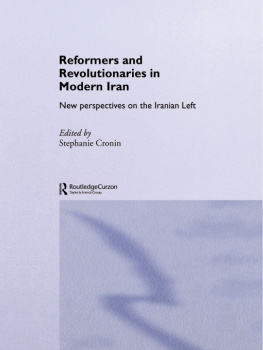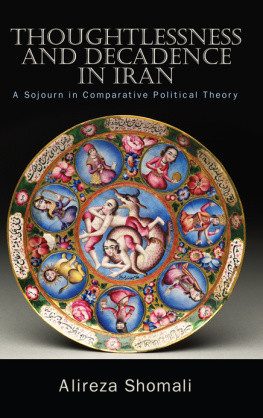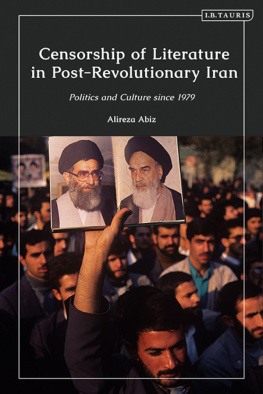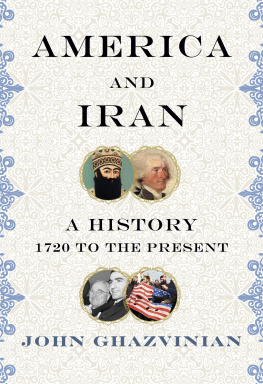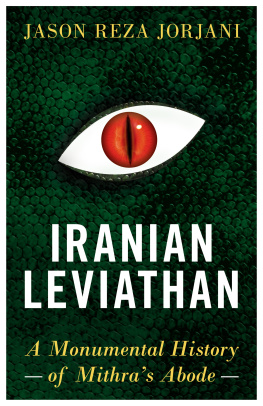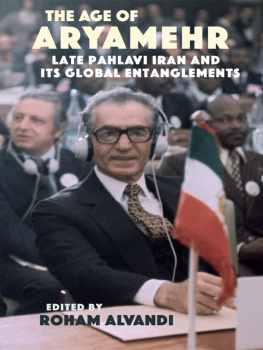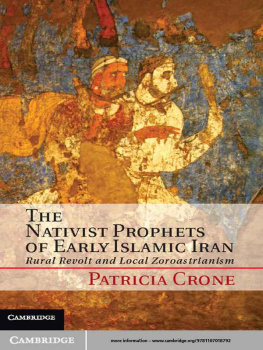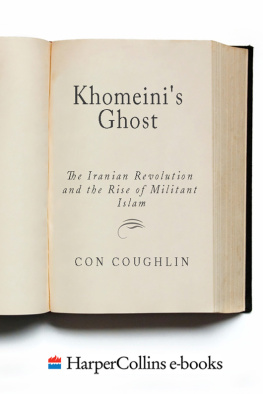
THE IRANIAN METAPHYSICALS
THE IRANIAN METAPHYSICALS

EXPLORATIONS IN SCIENCE, ISLAM, AND THE UNCANNY

ALIREZA DOOSTDAR
PRINCETON UNIVERSITY PRESS
PRINCETON AND OXFORD
Copyright 2018 by Princeton University Press
Published by Princeton University Press,
41 William Street, Princeton, New Jersey 08540
In the United Kingdom: Princeton University Press,
6 Oxford Street, Woodstock, Oxfordshire OX20 1TR
press.princeton.edu
Jacket art: Kamal ol-Mulk, Exorcist and Clients, c. 1900. Collection of Dr. Layla S. Diba.
Original painting photographed by Yoav Horesh.
All Rights Reserved
Library of Congress Cataloging-in-Publication Data
Names: Doostdar, Alireza, author.
Title: The Iranian metaphysicals : explorations in science, Islam, and the uncanny / Alireza Doostdar.
Description: Princeton ; Oxford : Princeton University Press, 2018. | Includes bibliographical references and index.
Identifiers: LCCN 2017023087| ISBN 9780691163772 (hardcover : alk. paper) | ISBN 9780691163789 (pbk. : alk. paper)
Subjects: LCSH: Islamic occultism. | Metaphysics. | Uncanny, The (Psychoanalysis) | MysticismIslam. | Islam and scienceIran.
Classification: LCC BF1434.I74 D66 2018 | DDC 130.955dc23 LC record available at https://lccn.loc.gov/2017023087
British Library Cataloging-in-Publication Data is available
This book has been composed in Linux Libertine O and Helvetica Neue LT Std
Printed on acid-free paper.
Printed in the United States of America
10 9 8 7 6 5 4 3 2 1
For my parents, Sue-San Ghahremani and Hossein Doostdar, And for Elham, Hassan, Ali Sina, and Ava.


CONTENTS

NOTE ON TRANSLITERATION
I follow the Iranian Studies journal in my transliteration of both spoken and written Persian. For Arabic, I use a modified version of the transliteration scheme of the International Journal of Middle East Studies (IJMES), with diacritical marks omitted for simplicity. Where an Arabic phrase appears in Persian speech, or a technical term has the same meaning in both Arabic and Persian, I choose one or the other transliteration style depending on the context. For the proper names of public figures, I use the common English-language spelling where available. Unless otherwise noted, all translations are my own.

ACKNOWLEDGMENTS
It has taken me more than ten years to write this book, from its first stirrings as a dissertation research project to the final draft of these acknowledgments. Over these years, the book project has extended its tentacles so deeply into my being and my relationships that I find it difficult any longer to discern who among my friends, family, colleagues, mentors, students, and acquaintances has not left an imprint on its formation. The final acknowledgment, I think, must be understood as the very act of completing this book. I could not have done it without the many forms of kindness, generosity, collegiality, questioning, skepticism, critique, patience, forgiveness, laughter, and love that I have been so fortunate to receive. If I did in the end complete the book, it was substantially motivated by the obligation to repay all of this.
First and foremost, I wish to thank my Iranian interlocutors for giving of their time and insight, for sharing what.
I wrote the first draft of this book as a doctoral dissertation at Harvard University. My dissertation committee, Steve Caton, Afsaneh Najmabadi, Smita Lahiri, Asad Ali Ahmed, and Engseng Ho, guided me through my earliest attempts to make sense of my materials and to write intelligently about them. The book has gone through many transformations since its incarnation as a dissertation, but I can still discern the profound ways in which their careful readings have molded my arguments. I hope I can follow their example and pay it forward with my own students. While at Harvard, I was also fortunate to learn from Michael Herzfeld, Cemal Kafadar, Arthur Kleinman, Catalina Laserna (without whom I may never have become an anthropologist), J. Lorand Matory, Khaled El-Rouayheb, Steven Shapin, Mary Steedly, Ajantha Subramanian, and Carl Sharif El-Tobgui. Although not members of my committee, Michael M. J. Fischer and Emilio Spadola graciously read the full final draft of my dissertation and offered keen observations and suggestions. I sincerely appreciate all of this help.
One of the most enduring gifts of my years as a graduate student has been the many friendships I developed and that continue to sustain my heart and mind. Among these friends, there are those whose critical engagement and comments have profoundly shaped my work. My thanks especially to Niki Akhavan, Diana Allan, Ata Anzali, Sepideh Bajracharya, Naor Ben-Yehoyada, Will Day, Ujala Dhaka-Kintgen, Aisha Ghani, Maryam Monalisa Gharavi, Vedran Grahovac, Nazli Kamvari, Mana Kia, Satyel Larson, Lital Levy, Darryl Li, Ketaki Pant, Sabrina Peric, Ramyar Rossoukh, Yasmine Al-Saleh, Sima Shakhsari, Anthony Shenoda, Naghmeh Sohrabi, Anand Vaidya, Sarah Waheed, and Emrah Yildiz.
At the University of Chicago, I have been fortunate to count myself a member of a lively and supportive intellectual community. When I arrived at the Divinity School in 2012 and for some years afterward, my dean, Margaret Mitchell, offered vital mentorship and support while acting as one of my most discerning readers. Bruce Lincoln read the entirety of an earlier draft and provided plentiful critical comments with his characteristic incisiveness, wit, and generosity. I have learned more from Hussein Ali Agrama than I can possibly recount here. He read multiple drafts of various chapters and pushed me to sharpen my arguments while keeping my eyes on the bigger picture. If academics were required to reveal the scaffolding behind their intellectual productions, mine would certainly have to include al-khinzir al-barjuwazi, mocha, and conversations with Hussein. During the incubation period of this book, the other crucial scaffolding consisted of Regenstein Library, swimming (or jogging, or just chilling out Middle Eastern style), and discoursing with Fadi Bardawil. Ya akh Fadi, this book is so much better for your sharp insights and compassionate criticism. Darryl Li has been with this project longer, and has read more drafts, than anyone else. I only hope I can repay him in kind for the care and precision with which he has engaged my work. Angie Heo has been a brilliant interlocutor and critic. Along with my other writing group partnersElina Hartikainen, Andy Graan, Sarah Fredericks, Leah Feldman, Darryl Li, Kareem Rabie, and Ghenwa HayekAngie has read multiple drafts of various sections of this book and offered invaluable suggestions for improvement. I am also indebted to a number of colleagues who have read individual chapters and provided critical feedback. Thanks especially to Dan Arnold, Sarah Hammerschlag, James Robinson, Richard Rosengarten, Michael Sells, and Christian Wedemeyer. None of this work would have been possible without the able support of the staff at the University of Chicago, especially Sandra Peppers, Julia Woods, and Terren Wein at the Divinity School, and Marlis Saleh at the Regenstein Library.
Next page
